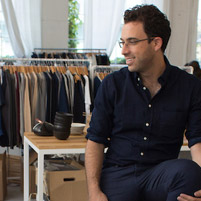Career Fashioning

Michael Preysman
Michael Preysman (E'07) is fascinated by the way things are made.
The Carnegie Mellon University alumnus' obsession led across several continents in his quest to found Everlane, an online clothing retailer that specializes in minimalist design and a radically transparent take on the fashion industry.
Preysman caught the entrepreneurial bug while he was at Carnegie Mellon.
"CMU is unique. It's hard to find a school where people are just as passionate about side projects as they are about the day to day of school," Preysman said.
He participated in engineering projects and business teams with his peers during his time in Pittsburgh, but it took several years before he would venture out on his own, in part because his game plan was to work in venture capital.
Looking back, Preysman said he can't complain about his time in finance. Shortly after graduation he was working with brands such as Pandora and Facebook.
"I saw not just how people turned nothing into something, but what that something looked like, what [entrepreneurs] were thinking about day to day, and how they envisioned the future," Preysman said.
That experience only intensified his desire to create something of his own. He soon turned his attention to the world of fashion.
"I was really frustrated with the lack of transparency in the retail space in general," Preysman said. "I just didn't get why these things cost what they do."
Finding an answer took him to a small town in Spain where his favorite wallet was constructed and to Chinese factories that fabricated his shirts. While hunting down the buildings where his clothes were stitched and seeking out the hands that fashioned them, he realized others might share his frustration with the industry's lack of transparency.
Everlane is rooted in radical transparency, a concept that governs everything from the factories selected to produce the clothing to the pricing posted on their website. Its business model and brand are so enmeshed, it's hard to tell the two apart.
"It is so important that we give transparency to our products and tell people what the costs are and where they're made," Preysman said. "We're sharing information, and creating more questions, and we're all more conscientious consumers because of it."
Everlane's commitment to publicly itemizing the cost of every input, including its markup, is revolutionary, but price is only one component of the company's commitment to transparency.
Its marketing gives customers a glimpse into the factories where their products are made. In an age where content is king, Everlane's content is decidedly introspective, turning cameras on the living conditions of workers in the factories that produce its products, interviewing designers and staff and encouraging followers to critique the company's social media strategy.
Everlane's soul-searching pays big dividends. It now boasts over 160,000 users in the United States and sales sell out regularly. The likes of Olivia Munn and Angelina Jolie have incorporated the company's fashion essentials into their wardrobes.
There's no question that Preysman is happy about Everlane's success, but the CEO said his focus is still on the everyday users who wear his brand. He takes pride in providing well-made, ethically sourced clothing to customers.
"We want to make beautiful products that help people live their lives." Preysman said. "More than anything, Everlane is a design brand — we're committed to Minimalism, and to being smart and honest in both form and function."
Related Links: Everlane.com | College of Engineering | Los Angeles Times article
